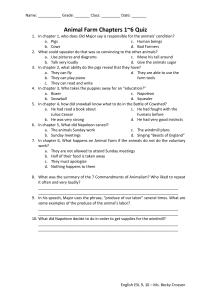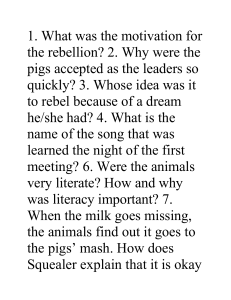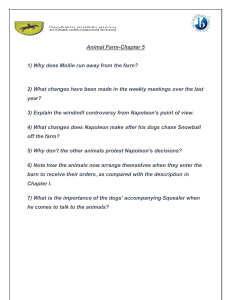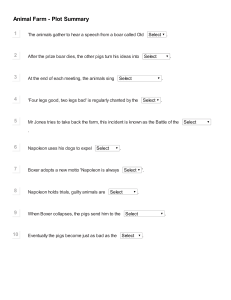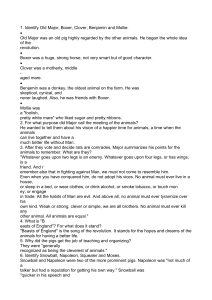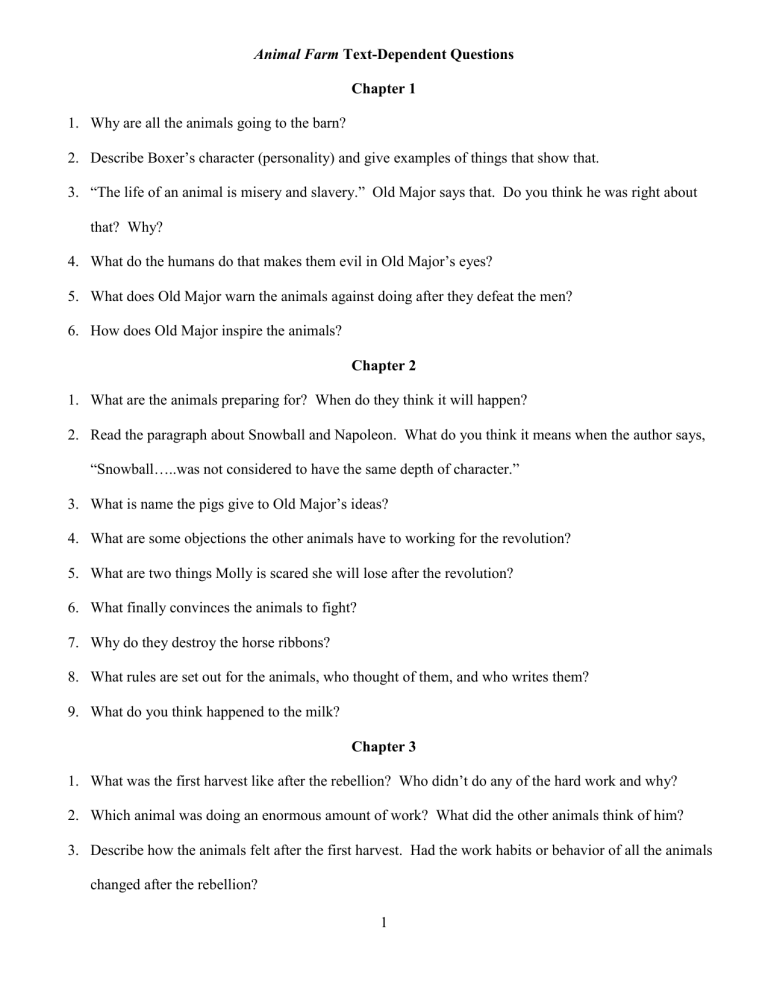
Animal Farm Text-Dependent Questions Chapter 1 1. Why are all the animals going to the barn? 2. Describe Boxer’s character (personality) and give examples of things that show that. 3. “The life of an animal is misery and slavery.” Old Major says that. Do you think he was right about that? Why? 4. What do the humans do that makes them evil in Old Major’s eyes? 5. What does Old Major warn the animals against doing after they defeat the men? 6. How does Old Major inspire the animals? Chapter 2 1. What are the animals preparing for? When do they think it will happen? 2. Read the paragraph about Snowball and Napoleon. What do you think it means when the author says, “Snowball…..was not considered to have the same depth of character.” 3. What is name the pigs give to Old Major’s ideas? 4. What are some objections the other animals have to working for the revolution? 5. What are two things Molly is scared she will lose after the revolution? 6. What finally convinces the animals to fight? 7. Why do they destroy the horse ribbons? 8. What rules are set out for the animals, who thought of them, and who writes them? 9. What do you think happened to the milk? Chapter 3 1. What was the first harvest like after the rebellion? Who didn’t do any of the hard work and why? 2. Which animal was doing an enormous amount of work? What did the other animals think of him? 3. Describe how the animals felt after the first harvest. Had the work habits or behavior of all the animals changed after the rebellion? 1 4. What was Snowball’s and Napoleon’s relationship like? 5. What did Napoleon do with the nine puppies? Why do you think he did this? 6. Who was drinking the milk? Who were the windfall apples for? How did the others feel about this? What did Squealer say that made the animals who didn’t get to eat the windfall apples satisfied? Chapter 4 Comprehension 1. How did animals who were not on Animal Farm view the rebellion at Animal Farm? 2. How did the humans view the rebellion at Animal Farm? 3. What happened at the Battle of Cowshed? 4. What does the Battle of Cowshed show us about Snowball, Boxer, and Mollie? 5. What human customs did the animals adopt to celebrate the Battle of Cowshed? What is the purpose of these customs? Chapters 1 to 5 Review 1. Animal Farm can be considered a “fable” or “parable”—a story, often with animal as characters, meant to teach a moral lesson (A lesson on how to live your life). Why do you think animals are used as characters, instead of humans? 2. Choose one event that happened in the first five chapters of Animal Farm. What message do you think George Orwell was trying to express by including this event? What lesson do you think it teaches? 3. What images come to your mind when you think of countries that are communist or totalitarian? 4. What does Animal Farm teach us about power? 2 Chapter 6 Comprehension 1. Was working on Sunday in fact voluntary for the animals? 2. Who was essential to the work of building the windmill? 3. In what ways were the original commandments being broken? Who was breaking them? 4. How did Napoleon and Squealer use Snowball to control the animals? Chapter 7 Comprehension 1. What did the humans think caused the windmill to fall down? What did the animals think caused the windmill to fall down? Did all the animals agree on what caused the windmill to fall? 2. Who inspired the animals to work on the windmill? 3. How did the animals conceal the fact that they were running out of food? Why did they do this? 4. How did Napoleon treat the other animals? 5. How was Snowball being used on Animal Farm? 6. Why did the dogs attack Boxer? 7. Why do you think the hens were actually working with Snowball? If not, why did they confess to being with Snowball? 8. How did the animals feel after all the executions of the traitors? 9. What happened to the song “Beasts of England”? Why did this happen? Chapter 8 Comprehension Questions 1. In what ways do the pigs use the other animals’ illiteracy and lack of intelligence to keep the animals from rebelling against the pigs? 2. In what ways is Napoleon treated like a very special animal? Why do the pigs want Napoleon to be considered special? 3 3. What clues are there in the account of the Battle of the Windmill that Napoleon might be a coward and that Squealer probably is a coward? 4. How does Squealer “spin” the Battle of the Windmill to make the animals happy and proud? Why does he do this? Chapter 9 Comprehension 1. What was Boxer looking forward to at the beginning of the chapter? Did he get to realize his desire? What happened to Boxer in this chapter? 2. Which animals’ rations were not reduced? Why? 3. What techniques did the pigs use to make the animals think their lives were okay? How did they get the animals to forget their problems? 4. In what ways were Napoleon and his family treated differently from the other animals? 5. Who returned to the farm after being gone for a long time? Why do you think the pigs allowed him to stay? 6. What did Squealer tell the animals about Boxer’s fate? How did Squealer and Napoleon twist the truth about Boxer in order to strengthen themselves? How did the pigs use Boxer’s body? Chapter 10 Comprehension Questions 1. Which animals got to retire? 2. Which animals benefited from the rebellion and which did not? 3. The pigs starting walking on their hind legs in this chapter and they began carrying whips. What do these things symbolize? Why was it important for the sheep to learn “Four legs good, two legs better”? 4. In his toast, what was it about Animal Farm that Mr. Pilkington admired? 5. What happened to the name Animal Farm? Why? 4
